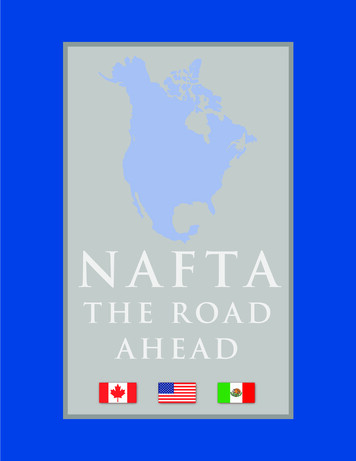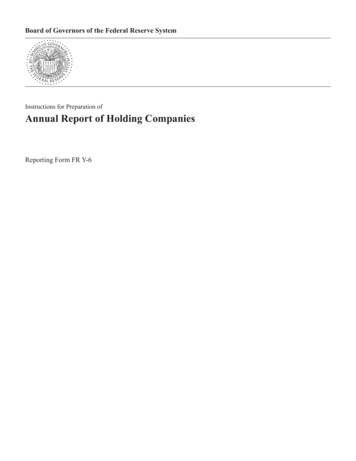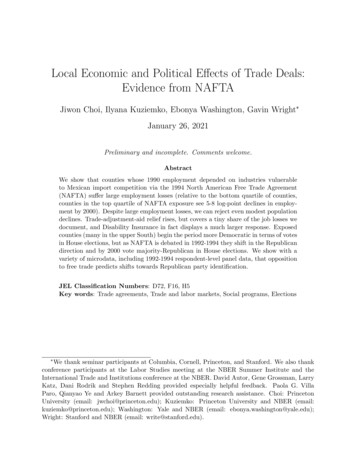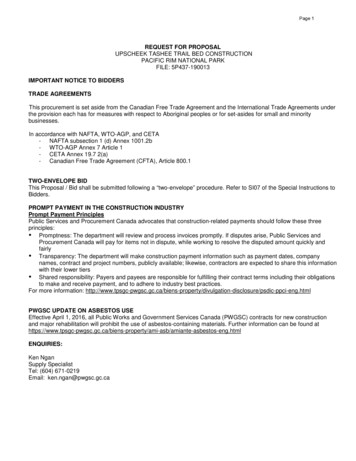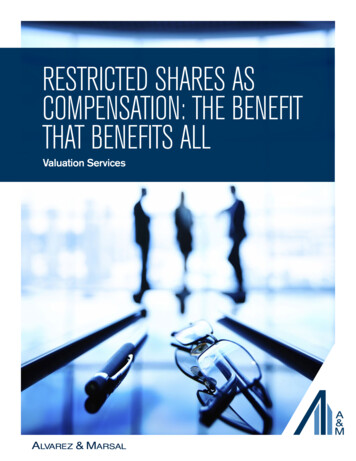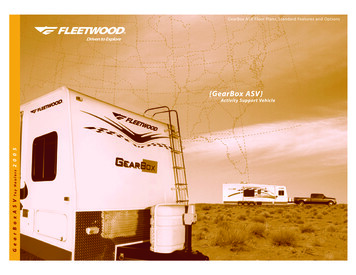
Transcription
INTERNATIONALBROTHERHOODOFTEAMSTERSAUGUST2006Lite Candrat idature e CIns ampide aigPa nge32THE NAFTA TRUCKERHoldingThe LineAn Exclusive InvestigativeReport On Mexican Truckersw w w . t e a m s t e r. o r g
IN THIS ISSUE2 TEAMSTER NEWSFEATURESl UPS Members FavorEarly Negotiations8 Holding The Linel Teamster.org LaunchesTranslation ServiceA Special Report On Cross-BorderTrucking By Charles Bowdenl Members Travel To D.C.For Police Weekl BLET ContractClarifies Rights16 Get On The Busl Comair Members WinBankruptcy MotionNational School Bus CampaignGains Momentum20 ORGANIZING26 The ApprenticeLocal 631’s Training CenterBuilds Teamster Powerl Victory At LAX16l Tankhaulers JoinLocal 553l Local 657 WelcomesRail Workersl Bradco Workers JoinLocal 379l Recycling DriversVote “Yes”28 COURT MATERIAL2632 ELECTION MATERIAL22 Member-To-MemberRank-And-File Members Organize The Unorganizedw w w.t e a m s t e r. o r gInternational Brotherhoodof Teamsters25 Louisiana Avenue, NW,Washington, DC 20001-2198202-624-6800The Teamster (ISSN 1083-2394) is the official publication of the International Brotherhood of Teamsters, 25Louisiana Avenue, N.W., Washington, DC 20001-2198. Itis published eight times a year in February, March/April,May, June/July, August, September, October/November andDecember/January. Periodical postage paid at Washington,D.C. and at additional mailing offices.GETTY IMAGESAUGUST2006/VOLUME103,NO.5 2006 International Brotherhood of Teamsters. All rightsreserved. Reproduction in whole or in part without written permission is prohibited. Postmaster: Send addresschanges to The Teamster, Affiliates Records Department,25 Louisiana Avenue, N.W., Washington, DC 200012198. Subscription rates: 12 per year. Single copies, 2. (All orders payable in advance.) Members shouldsend address changes to their local union.
A MESSAGE FROM THE GENERAL PRESIDENTCross-Border TruckingTo most Americans, the issue of crossborder trucking is a simple one. Nobodywants unsafe trucks endangering the livesof our loved ones. That’s why we havelaws that set the rules for those operatingtrucks on our highways.Unfair trade agreements like NAFTAsacrifice workers’ rights, public safetystandards and environmental protectionsin favor of protecting corporate interests.This is unacceptable. The health and safety ofour citizens must come first. Unsafe equipment operated by exhausted, exploited drivers is a recipe for disaster on our highways.If the U.S. border with Mexico is opened,millions of Americans would be directly inthe path of unsafe Mexican trucks. Manytimes, these unsafe trucks are overloaded andthe driver has been on the road for more than16 hours—and sometimes these drivers areunder the influence of illegal drugs. In addition, most of these trucks spew pollution at amuch higher rate than U.S. trucks that mustadhere to strict regulations.Thankfully, the Teamsters have been successful in preventing unsafe Mexican trucksfrom endangering American lives for the lastseven years. Through protests, lobbying andour unyielding support of regulatory actionand legislative initiatives, we have been ableto deny these trucks access to our nation’shighways. Rest assured, we will continue thefight to prevent these trucks from comingnorth.The NAFTA DisasterIt is important to remember, Mexican truckdrivers are not our enemies. Flawed tradeagreements that pit worker against workerare the real enemy. Corporations that believeprofits are more important than public safetyis who we should be fighting, not our brothers and sisters who are being exploited.NAFTA has been an unqualified disasterfor working families. It has failed to live upto the promises its advocates made in 1993.Instead of creating new jobs, American workers have lost 3 million jobs in manufacturingalone. Instead of creating trade surpluses, theU.S. is suffering through the worst trade deficits in its history.But NAFTA doesn’t discriminate when itcomes to hurting workers. Mexican workershave also suffered under NAFTA. Since itspassage, more than a million Mexican farmers have lost their livelihoods. Real wages arealso down significantly for workers south ofthe border. In fact, unfair trade agreementsare devastating workers across all of LatinAmerica.Is it any wonder that illegal immigration isat an all-time high?
TEAMSTER NEWSSpeaking OutUPS Members Favor Early Contract NegotiationsPackage-car driver GerryStack agrees with hiscoworkers that the Teamsters Union should pursueearly contract negotiations tobe in a stronger position toprotect members’ pensionsand to address other issues.“The biggest issue in myarea, by far, is protecting ourpensions,” said Stack, a 19-yearemployee of UPS and memberof Local 79 in Tampa, Florida.“By starting negotiations early,we’ll see where the companystands and the union will bein a better position to fight onour behalf.”In a recent survey, nearly 90percent of UPS Teamsters urgedthe union to pursue early contract negotiations—in advanceof the August 1, 2008 expirationof the National Master UnitedParcel Service Agreement. Thesurvey followed a scientific pollof UPS Teamsters showing similar concerns.A Permanent FixThe poll and survey resultsconfirm what union leaders are hearing all over thecountry—UPSers want theirpensions and health care protected. Retirementsecurity is the number one concern byfar, members say.Members knowthat Congress is notgoing to fix theseproblems today, sothe union needsto fix them at thebargaining table.UPS knows theTeamsters will dowhatever it takes tomake sure Teamsters at UPS arerewarded for theirhard work anddedication. TheUPS agreement covers morethan 200,000 members.The union is telling UPSit wants to start earlier thanusual because members needa permanent fix to the complex problems of pensionand health security, and thesecritical issues will take time tohammer out. It is importantfor members’ peace of mind.Members cannot afford to waituntil 2008 to have solutions tothese problems.Pressuring UPSThe UPS National Negotiating Committee, meeting atthe National Grievance Panelin Detroit in mid-April, votedunanimously to engage in aprogram to pressure UPS toenter into early negotiations.“By forcing UPS to thetable early this year ratherthan wait until late next yearor 2008, we would effectivelyposition ourselves to fightfor our members’ retirementsecurity and health care,” saidJim Hoffa, Teamsters GeneralPresident.After filling out the survey,UPS Teamsters were asked tosign petitions demanding thatthe company negotiate early.GENERAL EXECUTIVE BOARDJames P. HoffaGeneral President25 Louisiana Ave., NWWashington, DC 20001VICE PRESIDENTSAT-LARGERandy Cammack845 Oak Park RoadCovina, CA 91724TEAMSTERS CANADARobert Bouvier,PresidentTeamsters Canada2540 Daniel JohnsonSuite 804Laval, Quebec, CanadaH7T 2S3CENTRAL REGIONPatrick W. Flynn4217 South Halsted St.Chicago, IL 60609EASTERN REGIONJack CiprianiP.O. Box 35405Greensboro, NC 27425SOUTHERN REGIONTyson Johnson1007 Jonelle StreetDallas, TX 75217C. Thomas KeegelGeneral SecretaryTreasurer25 Louisiana Ave., NWWashington, DC 20001Fred Gegare1546 Main StreetGreen Bay, WI 54302Walter A. Lytle2644 Cass StreetFort Wayne, IN 46808Ken Hall267 Staunton Ave. SWSouth Charleston, WV25303Ken Wood5818 E. MLK Jr. Blvd.Tampa, FL 33619Carroll Haynes216 West 14th StreetNew York, NY 10011Tom Fraser1890 Meyerside Dr.Mississauga, OntarioCanada L5T 1B4Dotty Malinsky9409 Yukon Avenue S.Bloomington, MN55438John Murphy765 East Third StreetBoston, MA 02127Tom O’Donnell1 Hollow LaneSuite 309Lake Success, NY 11042Garnet Zimmerman7283 149th A StreetSurrey, B.C. CanadaV3S 3H4Lester A. Singer435 South Hawley St.Toledo, OH 43609Richard Volpe6 Tuxedo AvenueNew Hyde Park, NY11040Ralph J. Taurone47 West 200 SouthSuite 300Salt Lake City, UT84101Philip E. Young1668 N.W. 1000 RoadCreighton, MO 64739WESTERN REGIONJ. Allen Hobart14675 Interurban Ave. SSuite 301Tukwila, WA 98168Chuck MackP.O. Box 2270Oakland, CA 94621Jim Santangelo818 S. Oak Park RoadCovina, CA 91724TRUSTEESFrank Gallegos207 North Sanborn Rd.Salinas, CA 93905Henry B. Perry Jr.796 E. Brooks Ave.Memphis, TN 38116John Steger25 Louisiana Ave., N.W.Washington, DC 20001
Say What?Teamster.org Launches NewTranslation Service¿Qué?Ce qui?Non-English speaking readers no longer haveto wonder what’s being said on Teamster.org.Now they can read news items, learn moreabout organizing campaigns or receive legislative updates in their own languages.Until recently, if you didn’t speak English,the majority of the International Brotherhoodof Teamsters web site was largely off limits.But using the latest in automated translationtechnology, any page on the web site cannow be instantly rendered in one of a dozenlanguages.online population, according to WorldLingo,Translated in Secondstions to be 100 percent accurate, but read-To translate the web site’s text, look for the lineof international flags near the bottom of the webpage. Click the flag that represents the languageyou’d like read—French, Spanish, German,Italian, Portuguese, Dutch, Greek, Chinese (traditional and simplified), Japanese, Korean andRussian. The page you’re on, and other links thatyou go to, will be translated in seconds.This languages now available on Teamster.orgcovers approximately 90 percent of the world’sers should be able to gather the meaning ofHonoring the FallenTeamsters Travel to Washington, D.C. for Police WeekMembers of the TeamstersLaw Enforcement League(TLEL) from acrossthe country recently attendedPolice Week, a four-day tributeheld in Washington, D.C. tohonor officers and rememberthose killed in the line of duty.“We go to Washington,D.C. every year for Police Weekbecause we had several friendskilled in the line of duty,” saidOfficer Kirk Schend, a 16-yearpolice officer from Local 75 inGreen Bay, Wisconsin. “Theyshould be remembered not onlyfor what they did on the job, butwhat they did with their lives.”Schend handed out rosesto surviving family membersof fallen officers when theyarrived at the memorial, whilefellow Local 75 member Officer Jo Ann Mignon escortedfamily members to their seatsat the candlelight vigil.Teamster police officers par-ticipated in a variety of eventsduring Police Week, each honoring their fellow officers intheir own way.the Las Vegas company that provides theservice.The cultural nuances of language makeit impossible for computer-generated transla-the site’s content. Also, the program cannotchange words that are part of an image, suchas those in the Teamster.org banner, navigational rollovers or buttons. Still, WorldLingo’stechnology has placed it at the top of the automated translation business with its translations included on several thousand web sites.“Carved in Stone,” a tribute tothe Peace Officers MemorialWall in Washington, D.C.Sergeant Bob Haught, a 14year veteran of the Nashvillepolice department, has participated in the Police Unity Tourfor the past four years. Participants ride bicycles more than250 miles to help raise moneyfor the National Law Enforcement Memorial. The tour’smotto is “We Ride for ThoseWho Died.”“We meet the familiesof the fallen officers and wehelp them work through it. Ibelieve it helps give them someclosure,” Haught said. “I dothis bike tour to help fund thememorial so these fallen officers will never be forgotten.”Never ForgottenShaun Beebe, a Teamster policeofficer from Local 252 in Centralia, Washington, sang at the25th Annual National PeaceOfficer’s Memorial Service onthe West Lawn of the U.S. Capitol. Beebe sang his new song,w w w . t e a m s t e r. o r g AUGUST 2006 TEAMSTER3
TEAMSTER NEWSKeeping Jobs In The U.S.A.McKissick Teamsters and Management Cooperate to Keep Work at Homecommunication and workingtogether, the Teamsters andthe company have been able tosupply increasing demand fortheir products in Asia.Creating JobsAbanner hangs above thefreshly machined andpainted crane parts thatsit on the loading dock atMcKissick Blocks in Tulsa,Oklahoma:McKissick QualityWorking together for ourfamilies and our future.Teamster Pride“It’s a lot different than itwas 10 years ago,” said TonyJaboe, a steward at the company. “It seemed as if we wereconstantly butting heads.”Jaboe balls his fists and bangshis left and right hands together. “But then we realized wecan’t disagree on everything.So that’s where we started andeverything grew out of that.”Jaboe and the other 232Teamsters at McKissick havetaken an active role in improv-ing procedures and makingtheir workspaces safer andmore efficient. As a result, thecompany has resisted the trendin manufacturing to outsourceits work to foreign countries.Today, working conditionshave improved and productivity is up. So are sales. In fact,business hasn’t been this goodat McKissick for 25 years.Bursting BubbleIn the 1970s, high oil pricesin the wake of the OPEC oilembargo financed a boom indomestic energy explorationand production. As drillingintensified, so did demand forMcKissick’s block and tackleequipment. The bubble finallyburst in 1982. As the companysank into bankruptcy, it turnedto its employees and asked theInstead of exporting jobs,McKissick is once againcreating them. The 233employee company plansto add nearly a dozen jobsin 2006 to help feed itsAsian exports.4TEAMSTER AUGUST 2006 w w w . t e a m s t e r. o r gbargaining unit for wage concessions. Some workers werelaid off. Over time, businessimproved, but attitudes andworking conditions didn’t.“This place used to be adinosaur,” said Randy Campbell, President of Tulsa’s Local523. “The machines were old,their safety record was spottyand the place was a mess. Thisplace was always a troublespot for the local as far back Ican remember.”That’s why McKissick wasthe first place Campbell visitedwhen he became President.“I knew about trucking, but Ididn’t know about manufacturing,” Campbell said. “So Ispent a lot of time here gettingto know the guys, their concerns and the management.”By opening the lines of“It makes me sick when Isee companies shipping jobsoverseas,” said Danny Bullett,a Teamster machinist whohas worked for McKissickfor 39 years. “I think a lot ofthose companies could workharder to keep those jobshere in America. Cutting jobsand moving work to anothercountry is the easy way out asI see it.”Instead of exporting jobs,McKissick is once again creating them. The 233-employeecompany plans to add nearly adozen jobs in 2006 to help feedits Asian exports.“They are working smarter,not cheaper, and creating abetter product,” Campbell said.“And you know what? I know,and the workers know, moreabout this company than weever did before.”
A Healthy FutureConvention Center Workers Secure Wage Increases,Stronger Benefits“This is the best allaround contract we’vegotten here since I’vebeen a Teamster,” said LeifThornton, a 24-year memberof Local 82 in Boston. “It’sspectacular.”Thornton is among the500 Teamsters working at theBoston Convention Center. Astrong majority of the Local82 members recently ratifieda new three-year contractthat significantly raises wages,increases pension contributions and strengthens healthcare coverage.“The contract improvesthe things that matter most tomembers: wages, health careand pensions,” said John Perry,Director of the TeamstersTrade Show Division and Local82 President. “We were suc-cessful in securing an agreement we could all be proudof. We gave nothing back andstrengthened workers’ positions everywhere.”Big ImprovementsRetroactive to April 1, the newcontract improves wages andbenefits by 5.67 an hour overits three-year term. The wageand benefit improvementsinclude a 1 hourly wageincrease each year, plus hourlyhealth and welfare and pensionplans increases of 82 cents, 89cents and 97 cents during thefirst, second and third years.Local 82 members performall work, except electrical, atthe convention center. Thebargaining unit includes truckdrivers, forklift drivers, riggingworkers, warehouse workers,set-up workers and generallaborers.“This new contract is awesome,” said Rodney Simoes,a 15-year Local 82 member.“It raises wages and the healthcoverage is outstanding.”Simoes was forced to usehis health coverage this springwhen he and his wife were in anear-fatal motorcycle accident(they were broadsided by adriver in a car), landing Simoesin a coma for more than twoweeks.NewDealInNewEnglandBLET Contract at New England Central Clarifies RightsBrotherhood of Locomotive Engineersand Trainmen (BLET) members recentlyapproved a new four-year collective bargaining agreement with the New England CentralRailroad (NECR).The agreement provides wage increasesof 12 percent over the life of the contract,back pay, and improvements in work rulesand discipline procedures. About 50 members approved the new contract by a 2-1margin.“It’s the first BLET contract on the property and I consider it to be an impressiveimprovement over the old one,” said Ben Martin, General Chairman at NECR.“Everyone was happy to get the backpay,” said Spencer Hogan, a locomotiveengineer who has worked at the New EnglandCentral since 1998. Members received backpay for the four-month period after expirationof the old contract and prior to ratification ofthe new one.Protecting WorkersIn addition to providing wage increases, thenew agreement clarifies language to protectworkers’ rights and provide them with a moredefined disciplinary procedure.“A lot of gray areas have been clearedup,” Hogan said.BLET Local Chairman Scott Holbrook, whohelped negotiate the new deal, said the old con-Great Coverage“My wife and I were in thebest hospital in Massachusettsbecause of our coverage,”Simoes said. “The doctors andstaff were top notch. It made ahuge difference while we wererecovering.”“I’d always known howvaluable being a union member is,” Simoes said. “As soon asI get back to work, I’m goingto be a big advocate, tellingeveryone how good our healthcare coverage is.”tract “was riddled with carrier escape clauses.”“The old contract was vague,” said Holbrook, who has been a locomotive engineer atNECR for just over five years. “It was open forthe company to do what it wanted to do.”Closing the LoopThe new agreement contains a scope rulethat protects the work of locomotive engineers and conductors.“The new agreement provides protection from remote control. If the carrier everintroduces new technology, then we hold therights to the work,” Martin said. The scoperule also prevents the carrier from using contractors and other outside laborers.The NECR owns and operates 330 milesof track from Alburg, Vermont to New London,Connecticut, hauling primary commoditiessuch as fuel oil, lumber, cement and grain.w w w . t e a m s t e r. o r g AUGUST 2006 TEAMSTER5
TEAMSTER NEWSCabin PressureComair Flight Attendants Win Bankruptcy MotionGambling on her kids’health and welfare was notan option for Karen Terry,one of 1,100 flight attendantsat Comair being singled outfor drastic pay cuts in a bankruptcy motion the companyinitiated this spring.On February 21, the Cincinnati-based company—awholly owned subsidiary ofDelta Airlines—asked a federal bankruptcy court thatis handling Delta’s Chapter11 restructuring to rejectComair’s collective bargaining agreement with its flightattendants so that concessionscould be imposed.“The company was asking us for an average of a 30percent wage cut on top of bigcuts to our health care benefitslast year,” said Terry, who hasworked for Comair for 18years. “That was going to hurtmy kids and I wasn’t about tolet that happen.”Winning the FightFlight attendants sprung intoaction, distributing informational leaflets at airports andpetitioning the public and politicians for support. The flightattendants then overwhelmingly approved an authorization to strike on March 24,2006, shortly before the bankruptcy hearings started. Theflight attendants and the company were unable to work outa deal and then had to wait forthe judge to issue a decision.In late April, after numerous actions to garner com-munity support for theircause, Federal BankruptcyJudge Adlai Hardin refused thecompany’s motion to reject theTeamster contract.Judge Hardin found thatComair had not bargainedin good faith and had failedto meet the requirements ofbeing fair and proportionate inits concession demands.A Strong Stand“Comair’s non-negotiabledemand was that the flightattendants contribute twicetheir share of the cost cuts,while the pilots and mechanicswere asked for less than theirproportionate shares, basedon 2005 compensation,” JudgeHardin said. “The fact thatthe flight attendants are at ornear the lowest pay scale of allComair’s employees and therefore the least able to affordsevere cuts in their wages,compel me to the conclusion that It is not ‘fair andequitable’ to ask of the flightattendants double their prorata share based on their shareof employee compensation.”“This is a major victory forour flight attendants who tooka strong stand to protect theirfamilies and communities inthe face of Comair’s draconiandemands,” said Jim Hoffa,Teamsters General President.“This shows that the courtagreed that we were beingasked to shoulder onerousand unreasonable cuts,” saidConnie Slayback, President ofLocal 513 in Cincinnati. “Weare still willing to do our fairshare in response to the bankruptcy and we have been backat the bargaining table sincemid-May.”“This is a major victoryfor our flight attendantswho took a strong standto protect their familiesand communities inthe face of Comair’sdraconian demands.”—JIM HOFFA,TEAMSTERS GENERAL PRESIDENT6TEAMSTER AUGUST 2006 w w w . t e a m s t e r. o r g
Shenandoah’s True PrideDairy Workers in Virginia Score Solid ContractJ.T. Daniels and hiscoworkers at Shenandoah’s Pride Dairy in Mt.Crawford and Charlottesville,Virginia were pleased aboutthe health care savings in theirnew four-year contract.Approximately 60 workersfrom Local 29 in Waynesboro,Virginia, including cooler workers and milk delivery route drivers, voted overwhelmingly toratify the contract.“I think most workers arevery excited and for peoplewith families this really meansa lot,” said Daniels, a 28-yearmilk driver. “We have a good,secure feeling thanks to helpfrom our local leaders and theTeamsters Union.”Contract HighlightsThe agreement guarantees thatthe Joint Council 83 Health andWelfare Fund will cover the unit,which previously participatedin the company’s substandardhealth insurance plan.“When we got the Teamsters insurance, we got something that really topped thisoff,” said Guy Lam, a 23-yearmilk driver and chief stewardat the Mt. Crawford facility.“That made the contract as faras I am concerned.”Drivers will garner a 3percent raise in base pay anda 3 percent increase on commissions. Hourly workers willreceive wageincreases ofmore than 4percent, whichincludes timeand a half aswell as holidaypay and oneextra personalday. The unitalso gained DRIVE recognition in the contract.“It really is a great contractthat recognizes the contributions of our workers,” saidJohn Farrish, Secretary-Treasurer of Local 29.w w w . t e a m s t e r. o r g AUGUST 2006 TEAMSTER7
THE NAFTA TRUCKERHOLDING8TEAMSTER AUGUST 2006 w w w . t e a m s t e r. o r g
THE LINEInvestigative Reporter Charles Bowden’s Story inthe November 1999 Issue of The Teamster Told ofExploited, Exhausted, Unsafe Mexican Truck Drivers—Seven Years Later, Nothing has ChangedTHERE IS A PLAN NO ONE TALKS ABOUT VERY MUCH, ONE THATFLOATS OVER THE HORIZON LIKE AN APPROACHING STORM AT SEA.In this business dream, the Pacific ports of the United States will be shiftedsouth to new massive anchorages in Mexico even though this increases the shipping distance by 30 percent for all the Asian tonnage. These new ports will belinked by major train and truck arteries—NAFTA Corridors—to the cities of theUnited States and Canada. Mexican trucking companies will be bought (and arebeing bought up now) by American firms and Mexican truckers will deliver thefreight and freely drive all U.S. highways. In this plan, the shipping of the UnitedStates leaves union ports and the long haul trucking leaves union drivers.An enlarged I-35 will reach north from the sister cities of Laredo/Nuevo Laredo1,600 miles to Canada via San Antonio, Austin, Dallas/Ft. Worth, Kansas City, theTwin Cities and Duluth and I-69 will originate at the same crossing and streaknorth to Michigan. Each corridor will be about 1,200 feet wide. Six lanes will bededicated to cars, four to trucks and in the middle will be rail and utilities. Thegoods will come from new Mexican ports on the Pacific coast. At the moment, atleast five such corridors are on the drawing boards.This is the story of some of the drivers who will be used by this plan. They knownothing of this scheme. They are too busy simply surviving to study such matters.BY CHARLES BOWDEN /// PHOTOS BY JULIAN CARDONAw w w . t e a m s t e r. o r g AUGUST 2006 TEAMSTER9
“I stand in front of the yard ofTrans Mex Swift, an Americanowned Mexican trucking company. The traffic of the WorldTrade Bridge roars past. In lessthan an hour, four truck tiresexplode. Mexican truckers arenot coddled with good rigs orgood tires. One semi pulls over.Both tires on the left rear backaxle are gone and the truckerstares at rims resting on thepavement. One tire, he explains,went about 150 miles ago,but he had no money withwhich to buy another one.Now both are gone.”10TEAMSTER AUGUST 2006 w w w . t e a m s t e r. o r g
Professional SecretsThe five men sit at the truckstop tableabout 20 kilometers below the Rio Grandeat Laredo-Nuevo Laredo on the Texas border. They, or their sons or grandsons, maysomeday be shock troops on the NAFTACorridors. Just a few hundred yards fromwhere the men eat and smoke, the majorhighway coming from the Mexican southforks. One road leads into Nuevo Laredo,the other arcs west and connects just westof the city with a trucking center on theU.S. side by means of the World TradeBridge. This new bridge and dedicatedtruck highway is an early link in thisNAFTA Corridor. At the moment, 5,800trucks enter and leave this border crossingeach day, a trickle compared to the trafficthat will pour north once the new ports,rails and roads come on line by 2025.Their small lunch is finished, an emptyliter of beer stands before one driver, andat the moment, they smoke and laugh andtalk. For a Mexican trucker, life is an endless highway and the moments for conversation and fellowship can be few and farbetween.They don’t want their names usedbecause they don t want trouble and lifeon the roads of Mexico is trouble enough.“The longest distance I drive,” said adriver about 30 in a black T-shirt, “is fromEnsenada to Cancun, 4,500 kilometers. Fivedays and six nights alone. Tomatoes. Thecompany won’t pay for a second driver.”Ah, but how can a man stay awake anddrive for five straight days?The table erupts in laughter. The manfacing the empty liter of beer smiles andsays, “Professional secret.”The younger man in the black T-shirtoffers one phrase, “Magic dust.”There are more smiles and mention of“special chemicals.”And then they are off, a torrent ofwords and quips and smiles, and a knowing discussion of that jolt when a line ofcocaine locks in. They are all family menwho run the highways at least 25 days amonth and they are adamant about twothings—that nobody can run these longhauls without cocaine and crystal meth,and now and then some marijuana to levelout the rush. And that the biggest dangeron their endless runs comes from addictedMexican truck drivers, which means alltruck drivers.Dangerous DriversThe men earn about 1,100 a month. InMexico, the cost of living is roughly 80 or90 percent that of the U.S. The only realbargain in Mexico is labor. Many otheritems cost more than the U.S.—the telephone rates are among the highest in theworld and a sack of cement or a boardfoot of lumber costs more than in anyAmerican town.None of the drivers at the table hasdriven in the U.S. save for short crossingswhere they dump the load and instantlyreturn on special routes like the WorldTrade Bridge.The man with the empty beer explains“We make almost nothing—less than 300a week. I work 48 hours non-stop. I drive2,400 kilometers per trip and get no timefor turnarounds.”And every man at the table agrees ontheir biggest problem—the government.And by that they mean the police, especially federal, who rob them at will.“If you drive to Mexico City,” anotherdriver adds, “you are robbed, for sure.Police are the first to rob you. If you reporta robbery, the police try to make you theguilty person.”And now the table is rolling, about thebad equipment they are given, about thefact that the owners often stall them onpayment, about how there is no escapefrom the job, that they all know driverswho are still out there on long hauls at70, how they have all been robbed andhijacked, have all killed people with theirtrucks and, given the nature of Mexicanpolice, have all fled such accident sites,that they are all doomed to spend theirlives on an asphalt treadmill. And so theytake pride, enormous pride, in the factthat they can survive the life that has beendealt them.“Dust in the Air”The basic Mexican trucker is living thelife that American truckers once tastedbefore the Teamsters fashioned over-theroad contracts.There are warm moments in this life.Women.w w w . t e a m s t e r. o r g AUGUST 2006 TEAMSTER11
All over the country, a strangefigure has appeared in the lastfive years or so, La SantisimaMuerte,Most Holy Death. SheThe men talk with smiles of cachimbas,which means fireplaces. In earlier days onis skeletal, wears a long robe,the road, there would be wooden shackscarries a scythe and holds thewith fires going, roadside brothels. Mexicowhole world in her hand. Shenow has four-lane roads for many truckisrecognized by no church orroutes and stouter buildings, but the termgovernment. But she is known tocachimba has stuck for truckstops whereallwho move down these roads women and drugs are freely available.One man says, “Don’t print that. If youSemis constantly pull over,do, all those American
The union is telling UPS it wants to start earlier than usual because members need a permanent fix to the com-plex problems of pension and health security, and these critical issues will take time to hammer out. It is important for members' peace of mind. Members cannot afford to wait until 2008 to have solutions to these problems. Pressuring UPS


